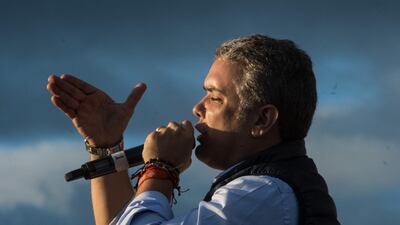Colombians vote on Sunday in a deeply divisive presidential ballot that has stirred fears the winner could upset a fragile peace accord with Marxist FARC rebels or derail the nation's business-friendly economic model.
In the first election since the peace deal was signed in 2016 with the Revolutionary Armed Forces of Colombia (FARC), voters will decide on a replacement for president Juan Manuel Santos, who won the Nobel Peace Prize for ending the five-decade-old conflict.
Leading candidate, right-wing Ivan Duque, has pledged to alter the terms of the peace deal and to jail former rebels for war crimes. Leftist Gustavo Petro, polling second, has said he would overhaul Colombia's orthodox economic policy and redistribute wealth from the rich to the poor.
Trailing them in the often-unreliable polls are mathematician and centrist Sergio Fajardo and former vice president German Vargas, who has Santos' support.
If no candidate gets more than 50 percent, the top two will go to a runoff on June 17.
_________________
Read more:
Colombia starts probing war crimes as part of peace deal
Last Colombia rebel group, the ELN, begins truce
Colombia's president receives Nobel Peace Prize
_________________
Campaigning in the traditionally conservative nation has been marked by acrimonious accusations that rival candidates will collapse the economy with socialist policies, force the nation back to the battlefield or bust the budget by overspending.
"These elections will decide the future of Colombia and maybe steer it toward an even more divided society that could end in a deep crisis," said Gregorio Sierra, a 52-year-old psychologist in the capital, Bogota. "It's scary."
Business-friendly Mr Duque, who was handpicked by hard-line former president Alvaro Uribe, has promised to cut corporate taxes and support oil and mining projects, as well as change the peace accord and impose tougher punishments for former FARC fighters.
Under the terms of the deal, thousands of rebels demobilized and the group is now a political party. But the accord drew ire from many who believe the FARC should be in prison and not in Congress.
Mr Petro, a combative populist who was once a member of the now-defunct M19 rebel group, supports the peace deal. But some of his economic policies spook investors and have prompted rivals to compare him to former Venezuelan president Hugo Chavez.
Polls suggest the end of the FARC conflict has shifted voters' priorities to inequality and corruption from security issues - opening the door to the left for the first time.
"These elections may realign the political axis to a more ideological right versus left," said Francisco Miranda, a political consultant.
With the highest rejection rate among all candidates, Petro is highly unlikely to win.
In the affluent Usaquen neighbourhood of the capital, Claudia Guerrero, a 28-year-old shop assistant, said she hoped fellow voters did not just hurl insults on social media but actually went to the polls.
"I hope many young people vote and above all I hope the losers accept the results," Mr Guerrero said. "Not only the candidates, but their followers."

